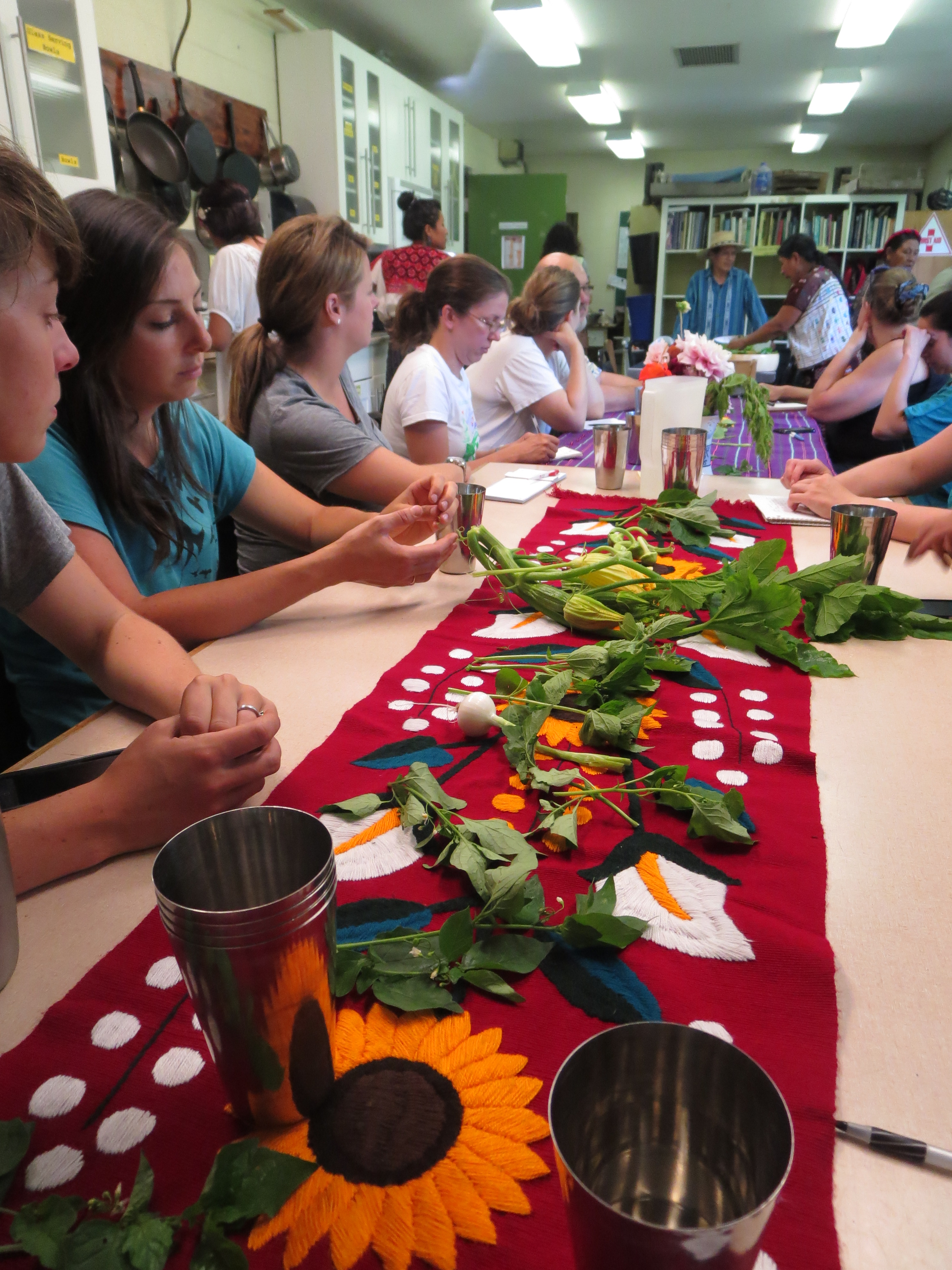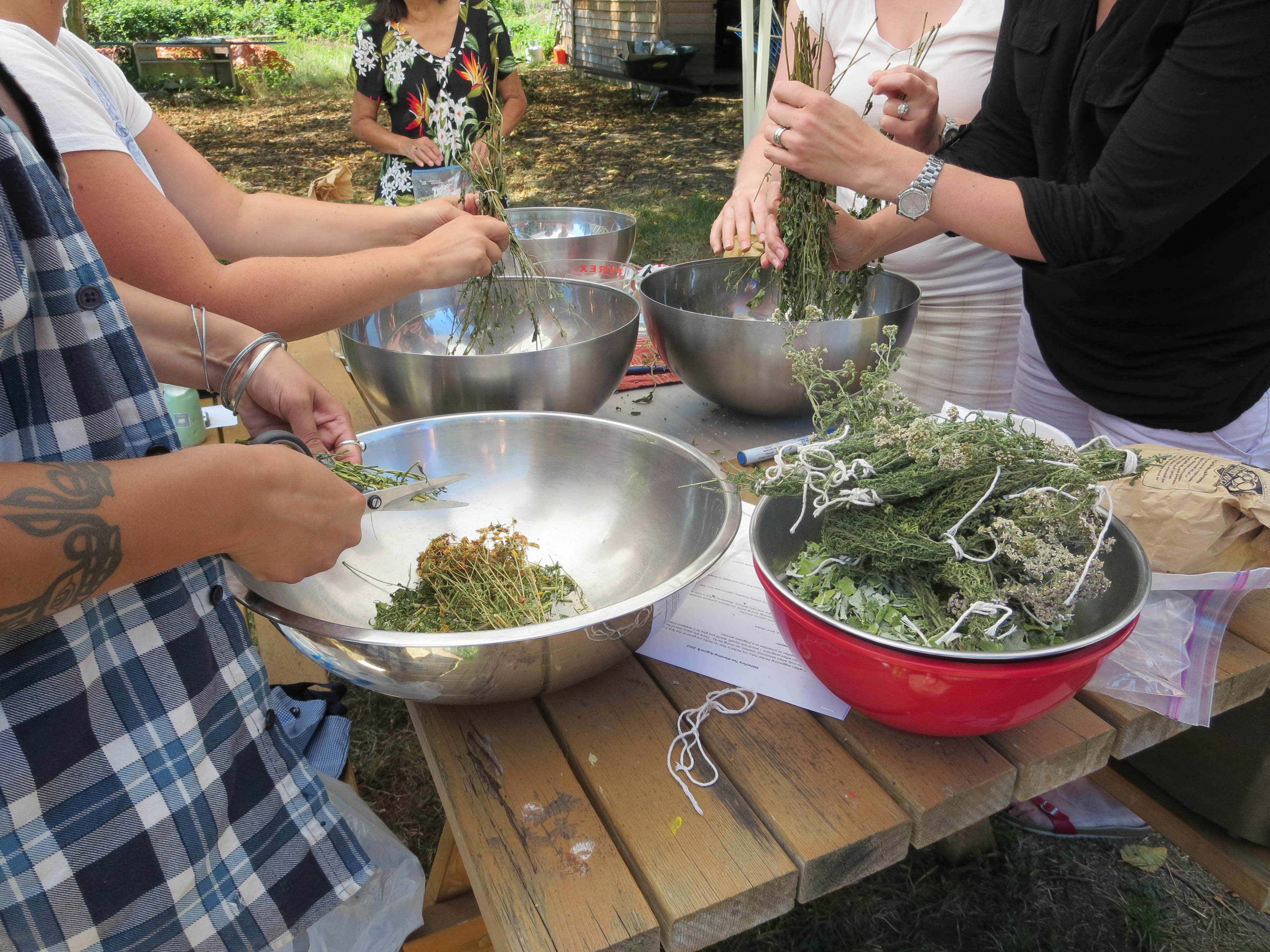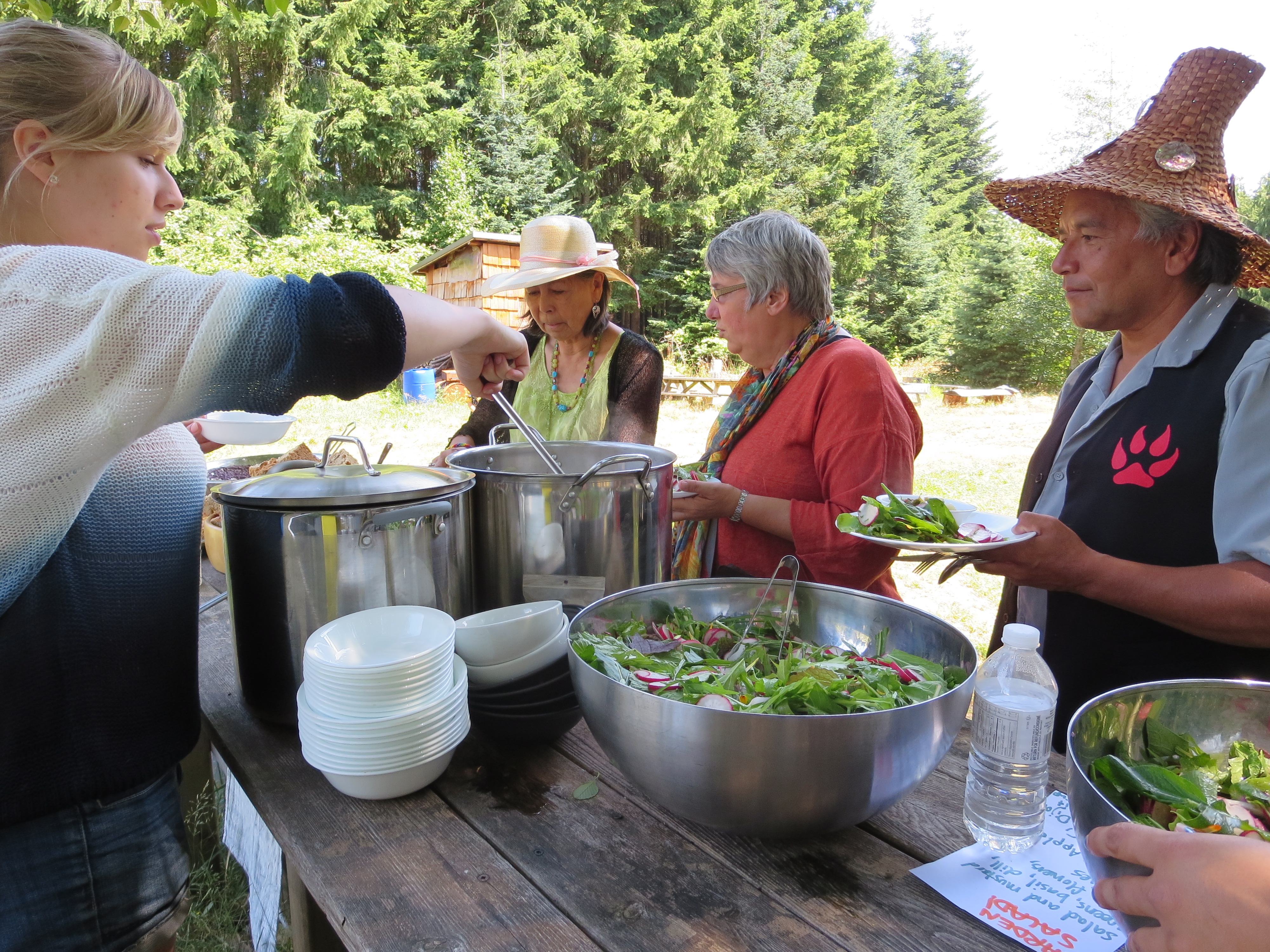Indigenous Gardens
The Centre for Sustainable Food Systems (CSFS) at UBC Farm is located on the unceded ancestral territory of the hən̓q̓əmin̓əm̓-speaking xʷməθkʷəy̓əm (Musqueam) people.
Four Indigenous initiatives run autonomously at the UBC Farm: the Culturally Relevant Urban Wellness Program (CRUW), developed in 2011 by Vancouver Aboriginal Child and Family Services Society, the Musqueam Garden, Tal A’xin: Maya in Exile Garden, established in 2000 as one of the longest-running community-based projects at the UBC Farm, and the Centre for Indigenous Land-Based Education, Research and Wellness at xʷćićəsəm Garden.
These programs bring thousands of visitors to the Farm each year and engage hundreds of UBC students through academic connections such as class visits, group projects, graduate research, and directed studies.
The Indigenous gardens’ programming supports the objectives of UBC’s First Nations House of Learning in promoting research that will benefit First Nations, Métis, and Inuit People, the specific research goals of the Centre for Indigenous Land-Based Education, Research and Wellness at xʷćićəsəm Garden, as well as the university-wide strategy for Indigenous engagement, as outlined in UBC’s Indigenous Strategic Plan (2020).
The Musqueam Garden is cultivated by members of the Musqueam community. It was previously cultivated by Elder Jeri Sparrow and the Sparrow family. The Garden provides an opportunity for the Musqueam community to deepen their connection with food and medicine, and mentor youth.

Members of the Maya in Exile Garden host a Traditional Maya Cooking Workshop with members of the public.
"The idea for the Maya garden began in 1986 when five Maya families came to Canada as refugees from Guatemala. For thousands of years, Our ancestors, the Mayan people have worked the land planting corn, beans and squash (the three sisters). The Maya civilization and culture has evolved around the planting of corn. The main goal of these Mayan families was to keep the Mayan traditions and culture alive by continuing to grow Maya crops in Canada. This has allowed the children to learn about their culture and strengthen their identity. It has reminded us of who we are and where we come from."
"In 1999, a friend and supporter of the Maya Indian Support Group and volunteer at the UBC Farm informed us about the possibility of applying for a project plot at UBC. The group welcomed the idea and in 2000, the garden was established at the UBC Farm."
"Initially, we planted the three sisters. Later on, we incorporated greens such as amaranth (bledo), yerba mora, and apazote, among other crops. Each season begins with a traditional Maya ceremony to ask permission to Mother Earth and the Creator to break the land and bless the seeds. Before we harvest corn, another ceremony is offered to thank the Creator and Mother Earth for all that has been produced. The garden continues to be a place for cultural sharing and sustaining ancestral practices."
Every year during the growing season (June-Sept) they host drop-in volunteer sessions in their garden at the UBC Farm. Everyone is welcome on Saturdays from 10-1pm. They also host a traditional Maya Cooking Class in the summer, keep an eye on our workshops page or subscribe to our weekly newsletter if you would like to know when it is open for registration.

UBC Midwifery students and community members blend dried medicine plants from the xʷc̓ic̓əsəm garden for tea in a workshop.
The xʷćićəsəm garden has been based at the farm since 2007, and until 2013 was overseen by the former Institute for Aboriginal Health. As part of the Indigenous Research Partnerships within UBC’s Faculty of Land and Food Systems, the xʷćićəsəm garden emphasizes teaching, learning, and research. It was gifted the name xʷc̓ic̓əsəm by xʷməθkʷəy̓əm (Musqueam) Elder Larry Grant in 2016 as part of a naming and pole-raising ceremony. xʷc̓ic̓əsəm means place of growing in the hən̓q̓əmin̓əm̓ language.
In 2023, out of the Indigenous Research Partnerships formed a new UBC academic Centre: Indigenous Land-Based Education, Research and Wellness at xʷćićəsəm Garden. This Centre is the culmination of many years of commitment, hard work and vision of Dr. Eduardo Jovel, Indigenous faculty, staff and students as well as allies, to develop a sacred, safe space on campus to support and advance Indigenous land-based cultural practices and pedagogies.
The Centre aims to serve educational and research needs related to Indigenous food sovereignty while increasing participants’ knowledge and access to both traditional and non-traditional plants. As with the other Indigenous programs at the UBC Farm, the xʷc̓ic̓əsəm garden is guided by the principle that ‘food is medicine,’ and thus that a holistic understanding of health and healing includes the food that people eat. For updates about the garden’s programs and ways to get involved, sign up for the newsletter here.
In addition to its international, community-based research, the xʷc̓ic̓əsəm garden supports two main program areas:
-
- The xʷc̓ic̓əsəm Garden grows over 40 varieties of medicinal plants that are native to the region. These are cared for and used by the Medicine Collective, a group of Indigenous Elders and Knowledge-keepers who lead medicine-making workshops and walks in the Garden with the community.
- The Culturally Relevant Urban Wellness program brings urban Indigenous and recent immigrant youth to the Garden from March to October. To find out more about the program, view the program booklet or view these short CRUW videos:
A major component of this is taking shape in the Land-Based Indigenous Working Group. Operating with the support of the Teaching and Learning Enhancement Fund, Kloshe Tillicum, and the Faculty of Land and Food Systems, this working group aims to support the future development of Indigenous initiatives at the Farm through engaging with the UBC community and those around the province engaging in work towards Indigenous food security. Based on a series of recent gatherings and design workshops, this working group plans to generate material for use in UBC classrooms, in other communities, and for future planning at the Farm. Upcoming gatherings will engage with more voices that will inform work in Indigenous food security at the UBC Farm and beyond.
The longer-term visions and goals for the Indigenous Initiatives are taking shape in the development of a Land-Based Indigenous Strategy for the UBC Farm. Operating with the support of the Centre for Indigenous Land-Based Education, Research and Wellness at xʷćićəsəm Garden, Teaching and Learning Enhancement Fund (TLEF), Kloshe Tillicum, and the UBC Faculty of Land and Food Systems, this process aims to support the future growth and development of Indigenous initiatives at the Farm through engaging with the UBC community and those around the province engaging in work towards Indigenous food security and sovereignty. Based on a series of recent gatherings and design workshops, this working group plans to generate material for use in UBC classrooms, in other communities, and for future planning at the Farm. Upcoming gatherings will engage with more voices that will inform work in Indigenous food security at the UBC Farm and beyond.

UBC students have the unique opportunity to connect their learning with the community through the Indigenous Initiatives. Pictured here: the 2014 Feast Bowl Intern serves lunch to Elders as part of a directed studies project.
The Indigenous initiatives at the UBC Farm collaborate in many exciting ways with UBC. Some examples of past and ongoing research projects with these initiatives include:
- PhD candidate's peer-reviewed article published in Health Promotion International exploring a decolonizing approach to health promotion in Canada using the Tu'wusht (formerly Urban Aboriginal Community Kitchen Garden) Project as a case study. (PhD work in Integrated Studies in Land and Food Systems)
- Curriculum development with the xʷc̓ic̓əsəm Garden CRUW Youth Program, through community service learning. (EDCP 585C, Theory and Dimensions of Place-based Learning: Critical, Eco- humanist and Indigenous Lenses)
- Nutrition workshops contributing to a culturally appropriate cookbook with the Tu'wusht Garden Project. (FNH 475, Nutrition Education in the Community)
- Collaboration with xʷc̓ic̓əsəm (formerly Institute for Aboriginal Health) Garden elders and knowledge-keepers to create a garden design plan. (LARC 580B, Independent Directed Study)
- Master's thesis: Story Gathering with the Urban Aboriginal Community Kitchen Garden Project, now the Tu'wusht Garden Project. (Master's in Integrated Studies in Land and Food Systems)
- Community service learning and ethnographic research with Tal A'xin: Maya in Exile Garden through the Immigrant Vancouver Ethnographic Field School. (SOCI 495A/ANTH 409A Advanced Studies in Sociology)
- Field course on food security in collaboration with Squamish First Nation and all of the Indigenous Initiatives. (APBI 497B, Engaging Indigenous Communities Through Community-Based Experiential Learning)
- Many SEEDS (Social Ecological Economic Development Studies) projects including engineering student research into culturally appropriate building design with the xʷc̓ic̓əsəm Garden. (APSC 261, Science and Technology)
- Master’s thesis research into the mental health outcomes of participating in a community-based horticulture project for urban Indigenous youth, through the Tu'wusht Garden project. (CNPS 599C, Master’s in Counseling Psychology)
See The Centre for Sustainable Food Systems' Publications Library for more information.
Partners
Indigenous projects and programming at the UBC Farm are made possible through long standing relationships with many organizations and individuals, including:
- Centre for Indigenous Land-Based Education, Research and Wellness at xʷćićəsəm Garden
- First Nations House of Learning
- Faculty of Land and Food Systems
- Indigenous Research Partnerships, Faculty of Land and Food Systems
- Vancouver Native Health Society